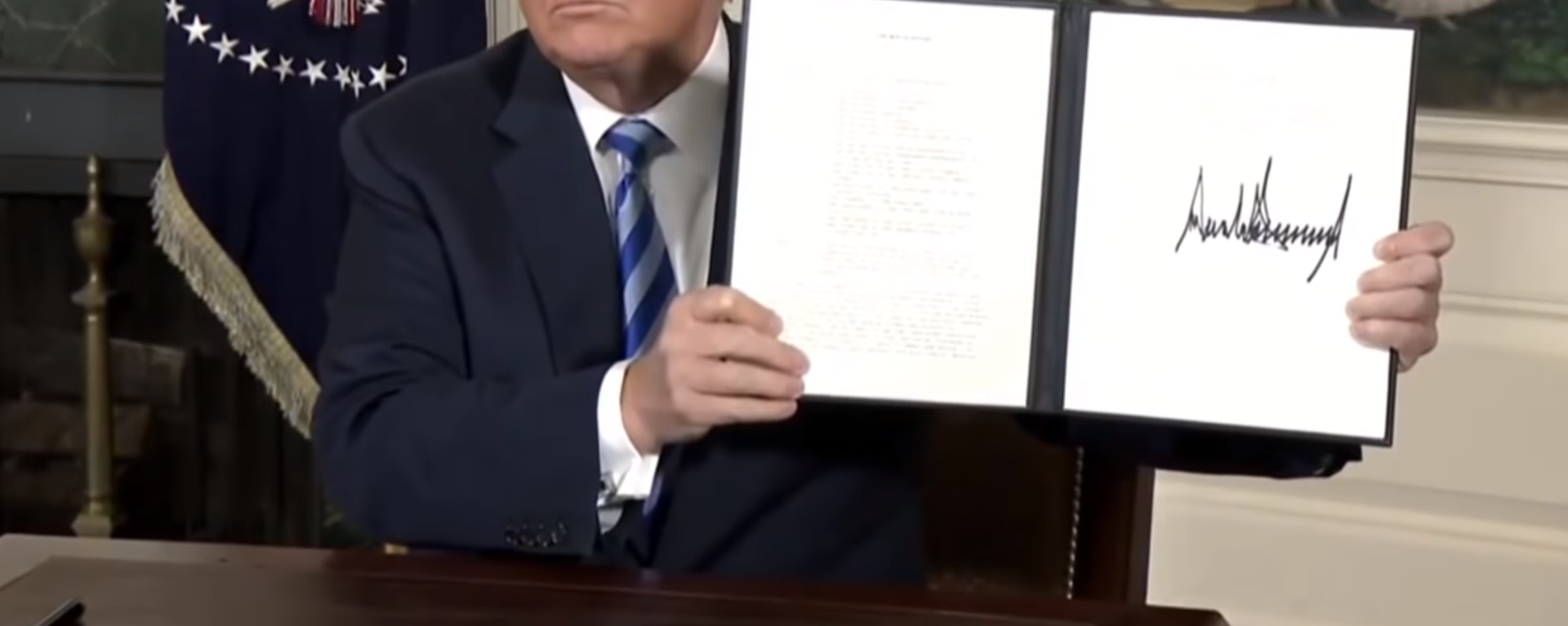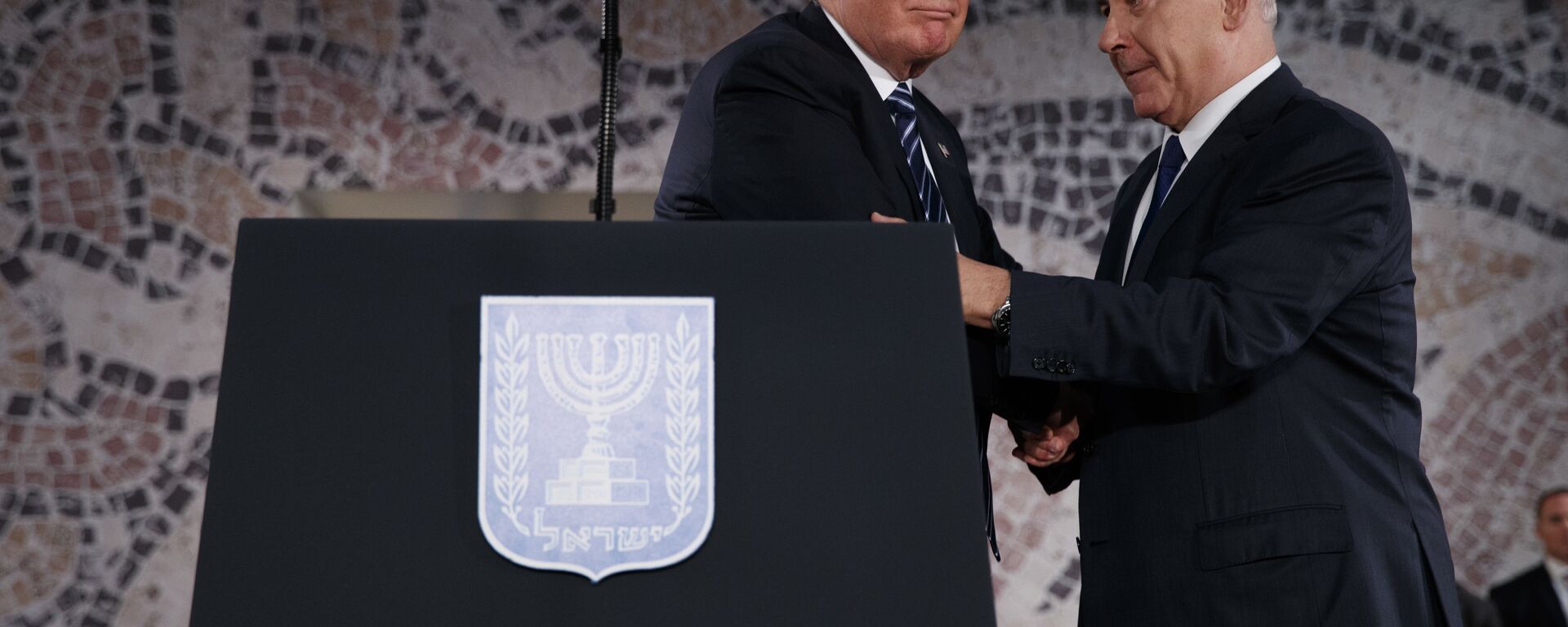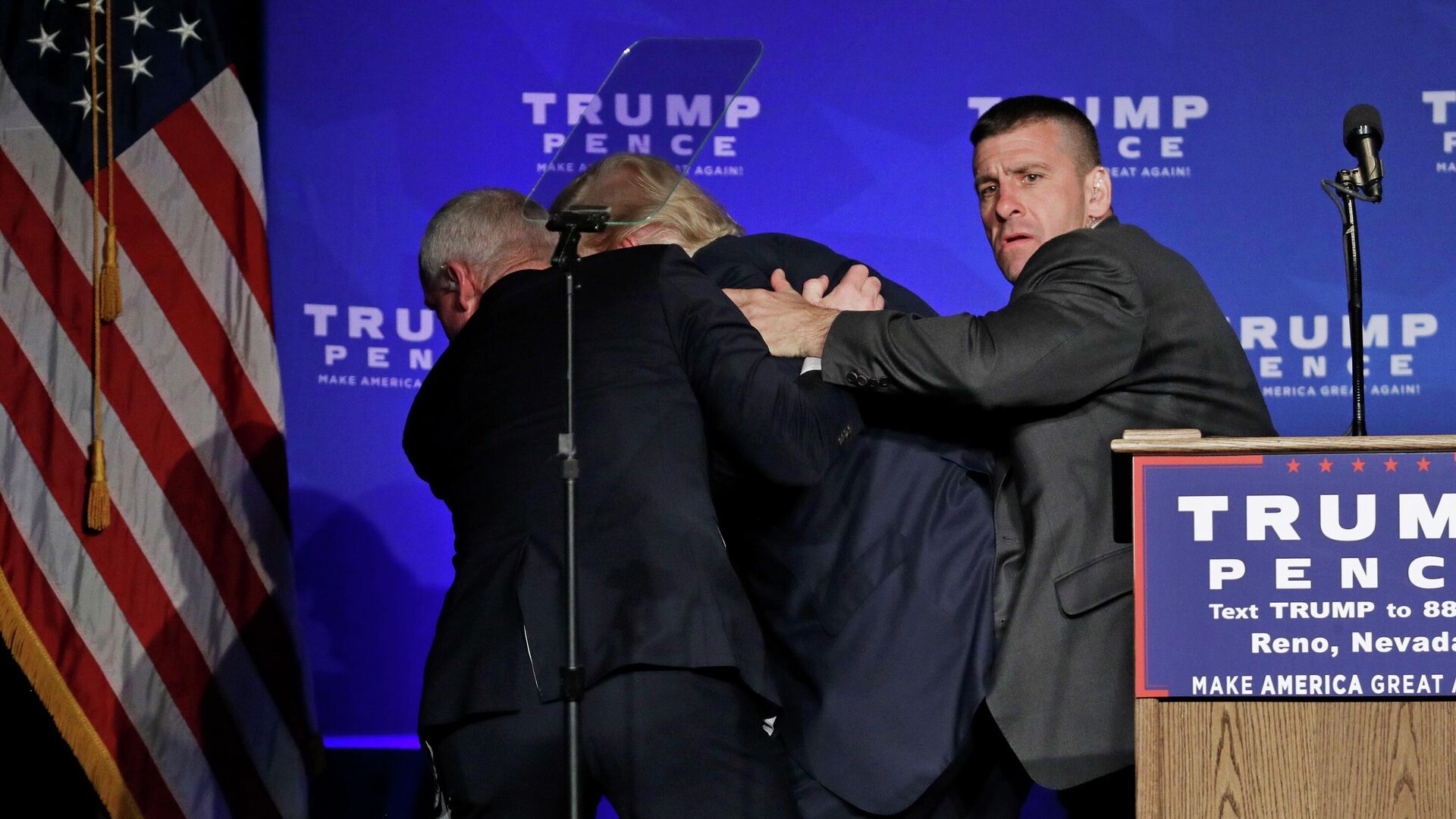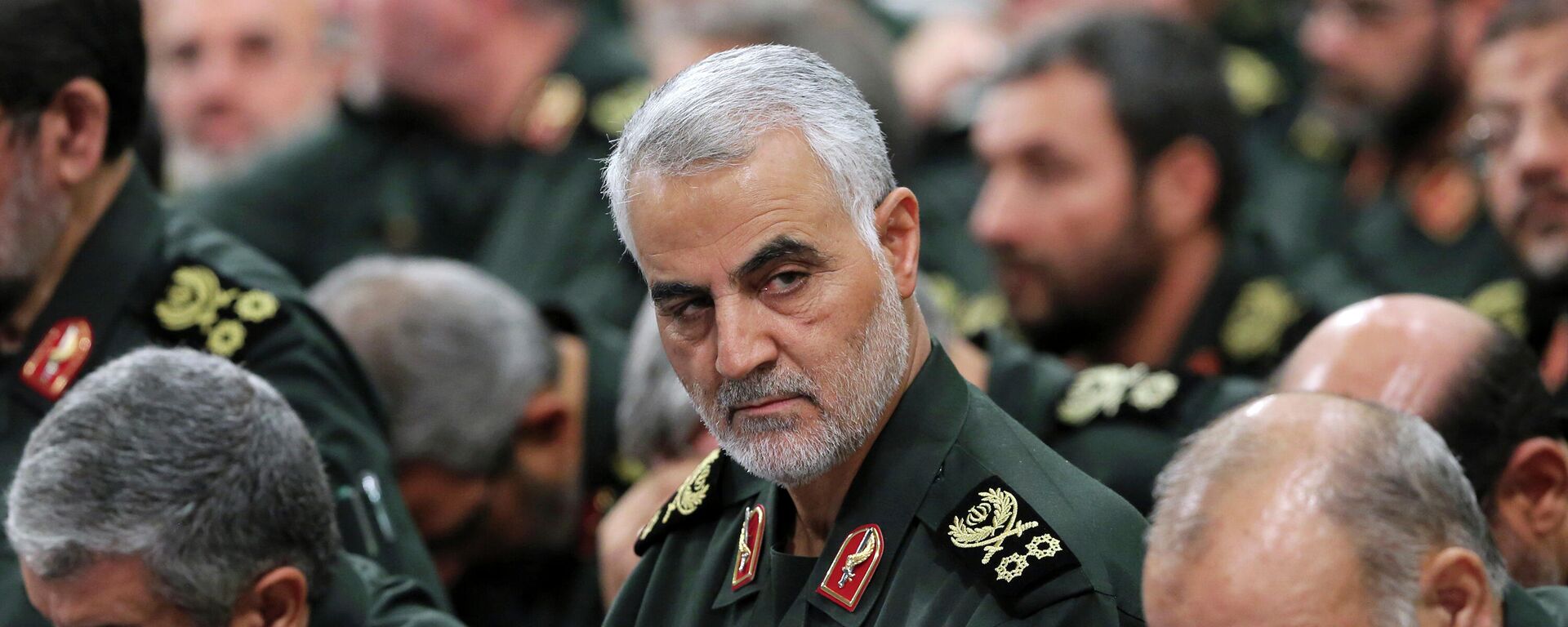https://sputnikglobe.com/20220914/trump-feared-iran-would-assassinate-him-after-soleimani-killing-book-claims-1100767176.html
Trump Feared Iran Would Assassinate Him After Soleimani Killing, Book Claims
Trump Feared Iran Would Assassinate Him After Soleimani Killing, Book Claims
Sputnik International
The former president signed off on the killing of Iranian anti-terror commander Qasem Soleimani in January 2020 after being told by officials that Soleimani’s... 14.09.2022, Sputnik International
2022-09-14T13:19+0000
2022-09-14T13:19+0000
2022-09-14T13:36+0000
iran
qasem soleimani
donald trump
mark milley
https://cdn1.img.sputnikglobe.com/img/07e6/09/0e/1100766657_0:0:2939:1654_1920x0_80_0_0_70bdba531d3e0161775e0782bfc68dad.jpg
Donald Trump reportedly expressed fears in the closing weeks of his presidency that Iran might try to assassinate him in retaliation for the murder of Islamic Revolutionary Guard Corps Quds Force commander Qasem Soleimani.In a new book titled "The Divider: Trump in the White House, 2017-2021," authors Peter Baker and Susan Glasser allege that “at a cocktail party” in December 2020, “Trump told several of his Florida friends that he was afraid Iran would try to assassinate him, so he had to go back to Washington where he would be safer.”The book’s authors, who boasted “unprecedented access” to key players in the Trump White House, including Trump himself, also corroborated earlier reports that the Republican personally ordered Soleimani’s killing, and that he did not brief Congress in advance.‘You’re Gonna Have a F***ing War’The book also made a number of other Iran-related claims. According to the authors’ sources, Trump and his officials met in January 2021 to discuss possible strikes against the country’s nuclear energy program, but the president’s focus on the effort to overturn the results of the 2020 election foiled hawks in his administration, including President Mike Pence. “He realized the clock ran out,” Joint Chiefs Chairman Mark Milley reportedly told his own staff.Milley also reportedly met with Israeli Prime Minister Benjamin Netanyahu in December 2020 as the latter lobbied Trump to strike, and told him that “if you do this, you’re gonna have a f***ing war.”Shortly after the Soleimani hit in January 2020, Milley reportedly asked Pence why he was pressing Trump to launch strikes against Iran. “Because they are evil,” was Pence’s reply. “Mr. Vice President, there’s a lot of evil in the world, but we don’t go to war against all of it,” Milley said. The Joint Chiefs chairman’s consternation reportedly grew as 2020 wore on after he overheard an unnamed “senior official” telling Trump that he should strike Iran’s nuclear program if he lost the November election. Milley reportedly referred to the incident as a “what the f*** are these guys talking about?” moment.In November 2020, the commander characterized Trump advisor-turned-acting defense secretary Christopher Miller as a “f***ing madman” after a meeting on potential strikes against Iran, and told the president that if he authorized an attack on Iran, it would start a war. At a separate meeting, Milley reportedly told Trump officials that White House staff would “be tried as war criminals in The Hague” if the Pentagon moved forward with their proposals.Qasem Soleimani and nine of his comrades, including Iraqi Popular Mobilization Unit deputy commander Abu Mahdi al-Muhandis, were killed in a US drone strike in Baghdad on January 3, 2020. Iranian Supreme Leader Ayatollah Ali Khamenei and other senior Iranian political and military leaders subsequently threatened to take “revenge” on those who perpetrated the assassination when the time was right. Days after the attack, Tehran launched a ballistic missile strike against a pair of US bases in Iraq, causing major damage to the bases and leaving over 100 US military personnel with traumatic brain injuries.Tehran has publicly rejected the concept of tit-for-tat killings, with officials complaining that they could not find an American commander or political leader equally valuable to Soleimani – who enjoyed popularity among Iran’s religious conservatives, ordinary Iranians, and Muslims and Christians across the Middle East for his exploits fighting Islamist extremism in Iraq and Syria, and Israel in Lebanon.Earlier this year, on the two-year anniversary of Soleimani’s assassination, Iranian President Ebrahim Raisi called for Trump, “the main violator and murderer and criminal” to be “put on trial and punished” for the murder.Iranian officials have repeatedly threatened to take Trump and his aides to The Hague, Iraq, or Iran for trial. However, last year, Interpol refused an Iranian request to issue a red notice for the arrest of Trump and 47 other US officials, citing its inability to undertake “any intervention or activities of a political, military, religious or racial character.”
https://sputnikglobe.com/20220831/photo-one-of-classified-docs-found-at-mar-a-lago-was-from-day-after-trump-announced-jcpoa-pullout-1100240852.html
https://sputnikglobe.com/20211210/f-him-bitter-trump-bashes-netanyahu-over-bibis-efforts-to-cozy-up-to-biden-1091415003.html
https://sputnikglobe.com/20220413/killing-of-all-us-leaders-wont-avenge-blood-of-soleimani-irgc-commander-says-1094737242.html
iran
Sputnik International
feedback@sputniknews.com
+74956456601
MIA „Rosiya Segodnya“
2022
News
en_EN
Sputnik International
feedback@sputniknews.com
+74956456601
MIA „Rosiya Segodnya“
Sputnik International
feedback@sputniknews.com
+74956456601
MIA „Rosiya Segodnya“
iran, qasem soleimani, donald trump, mark milley
iran, qasem soleimani, donald trump, mark milley
Trump Feared Iran Would Assassinate Him After Soleimani Killing, Book Claims
13:19 GMT 14.09.2022 (Updated: 13:36 GMT 14.09.2022) The former president signed off on the killing of Iranian anti-terror commander Qasem Soleimani in January 2020 after being told by officials that Soleimani’s activities posed a threat to US troops in Iraq. Days after the assassination, the White House admitted it had “no specific intelligence” pointing to any plots by Soleimani against Americans.
Donald Trump reportedly expressed fears in the closing weeks of his presidency that Iran might try to assassinate him in retaliation for the murder of Islamic Revolutionary Guard Corps Quds Force commander Qasem Soleimani.
In a new
book titled "The Divider: Trump in the White House, 2017-2021," authors Peter Baker and Susan Glasser allege that “at a cocktail party” in December 2020, “Trump told several of his Florida friends that he was afraid Iran would try to assassinate him, so he had to go back to Washington where he would be safer.”
The book’s authors, who boasted “unprecedented access” to key players in the Trump White House, including Trump himself, also corroborated earlier reports that the Republican personally ordered Soleimani’s killing, and that he did not brief Congress in advance.

31 August 2022, 19:04 GMT
‘You’re Gonna Have a F***ing War’
The book also
made a number of other Iran-related claims. According to the authors’ sources, Trump and his officials met in January 2021 to discuss possible strikes against the country’s nuclear energy program, but the president’s focus on the effort to overturn the results of the 2020 election foiled hawks in his administration, including President Mike Pence. “He realized the clock ran out,” Joint Chiefs Chairman Mark Milley reportedly told his own staff.
Milley also reportedly met with Israeli Prime Minister Benjamin Netanyahu in December 2020 as the latter lobbied Trump to strike, and told him that “if you do this, you’re gonna have a f***ing war.”

10 December 2021, 11:37 GMT
Shortly after the Soleimani hit in January 2020, Milley reportedly asked Pence why he was pressing Trump to launch strikes against Iran. “Because they are evil,” was Pence’s reply. “Mr. Vice President, there’s a lot of evil in the world, but we don’t go to war against all of it,” Milley said. The Joint Chiefs chairman’s consternation reportedly grew as 2020 wore on after he overheard an unnamed “senior official” telling Trump that he should strike Iran’s nuclear program if he lost the November election. Milley reportedly referred to the incident as a “what the f*** are these guys talking about?” moment.
In November 2020, the commander characterized Trump advisor-turned-acting defense secretary Christopher Miller as a “f***ing madman” after a meeting on potential strikes against Iran, and told the president that if he authorized an attack on Iran, it would start a war. At a separate meeting, Milley reportedly told Trump officials that White House staff would “be tried as war criminals in The Hague” if the Pentagon moved forward with their proposals.
Qasem Soleimani and nine of his comrades, including Iraqi Popular Mobilization Unit deputy commander Abu Mahdi al-Muhandis, were killed in a US drone strike in Baghdad on January 3, 2020. Iranian Supreme Leader Ayatollah Ali Khamenei and other senior Iranian political and military leaders subsequently threatened to take “revenge” on those who perpetrated the assassination when the time was right. Days after the attack, Tehran launched a ballistic missile strike against a pair of US bases in Iraq, causing major damage to the bases and leaving over 100 US military personnel with traumatic brain injuries.
Tehran has publicly rejected the concept of tit-for-tat killings, with officials
complaining that they could not find an American commander or political leader equally valuable to Soleimani – who enjoyed popularity among Iran’s religious conservatives, ordinary Iranians, and Muslims and Christians across the Middle East for his exploits fighting Islamist extremism in Iraq and Syria, and Israel in Lebanon.
Earlier this year, on the two-year anniversary of Soleimani’s assassination, Iranian President Ebrahim Raisi called for Trump, “the main violator and murderer and criminal” to be
“put on trial and punished” for the murder.
Iranian officials have repeatedly threatened to take Trump and his aides to The Hague, Iraq, or Iran for trial. However, last year, Interpol refused an Iranian request to issue a red notice for the arrest of Trump and 47 other US officials,
citing its inability to undertake “any intervention or activities of a political, military, religious or racial character.”






